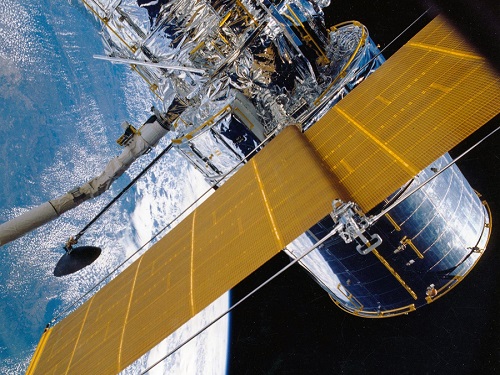
A feasibility study is to be carried out into whether solar powered data centres could be put into orbit to reduce their carbon footprint.
Who And What?
The European Commission has chosen Thales Alenia Space, a joint venture between aerospace and defence companies Thales (67 per cent) and Leonardo (33 per cent) to lead the ASCEND (Advanced Space Cloud for European Net zero emission and Data sovereignty) feasibility study as part of Europe’s vast Horizon Europe research program.
Why?
A growing number of devices and the IoT, the increased demand digitalisation and for cloud services mean that data centres in Europe and other parts of the world are growing at an exponential rate. Data centres, however, require large amounts of power and are major carbon producers. This means that they are having environmental and energy impact.
The idea of moving data centres into the earth’s orbit, powered by solar power plants would not only solve the problem of the carbon (and physical) footprint of data centres but, in the process, make it more likely that Europe’s Green Deal goal of achieving carbon neutrality by 2050 can be met.
The Feasibility Study
Thales says that the project is expected to demonstrate to what extent space-based data centres would limit the energy and environmental impact of their ground counterparts. Thales also says that feasibility study will have two main objectives, which are:
1. “To assess if the carbon emissions from the production and launch of these space infrastructures will be significantly lower than the emissions generated by ground-based data centres”.
2. “To prove that it is possible to develop the required launch solution and to ensure the deployment and operability of these spaceborne data centres using robotic assistance technologies currently being developed in Europe, such as the EROSS IOD demonstrator.”
Investment If Feasible
If the feasibility study indicates that building and launching orbiting solar-powered data centres produces less carbon than normal, terrestrial data centres, Thales says this could mean major investments within the scope of Europe’s Green Deal. It could also justify the development of a more climate-friendly, reusable heavy launch vehicle, thereby enabling Europe to regain its leadership in space transport and space logistics, and the assembly and operations of large infrastructures in orbit.
What Does This Mean For Your Organisation?
Data centres are power-hungry and produce a lot of carbon. With demands upon and demand for data centres increasing, but the need to reduce their carbon footprint and meet environmental targets mean the search for solutions is on. Carbon offsetting has been a major way that big tech companies have tried to become carbon neutral, but this doesn’t stop the carbon being released in the first place. On the face of it, putting solar-powered data centres into orbit sound a promising idea, but the scale of the data centres needed, and the carbon footprint of the development, testing, and operation of spacecraft that blasts them into orbit in the first place mean that it’s possible that they may not be more environmentally friendly than current data centres. If the feasibility study shows that putting data centres in orbit does significantly reduces their carbon footprint, this could bring the funding that could help make it a reality.




